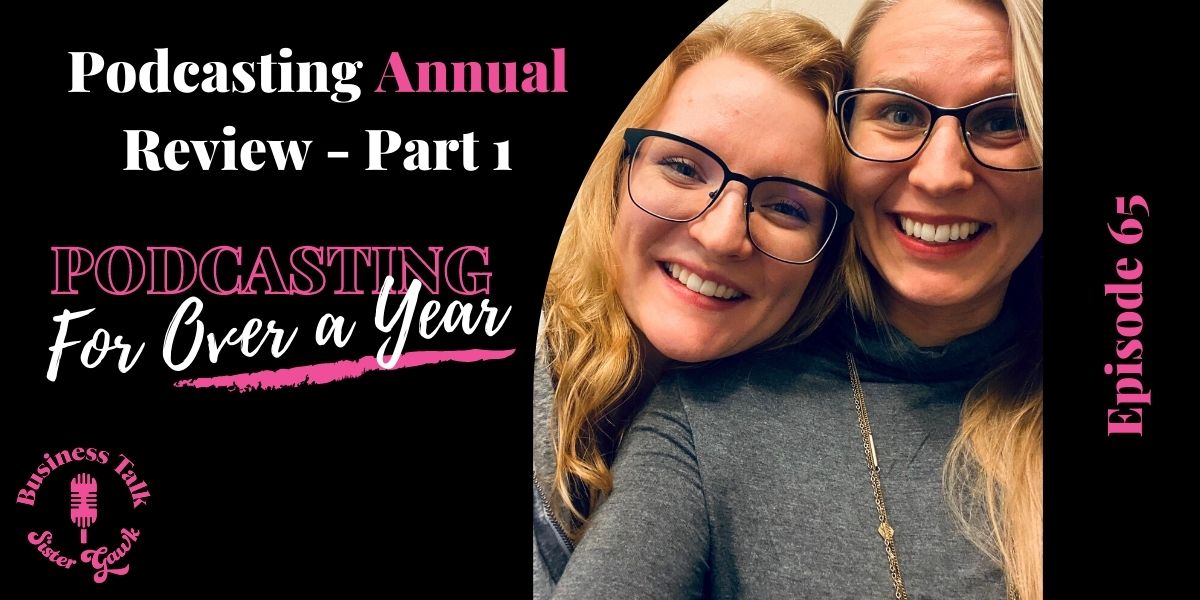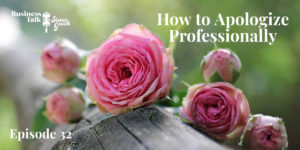After a year of podcasting, we wanted to reflect on what we have learned, and how it has helped us grow in our skills with the lessons we have learned that we think are valuable to share with you. This week, we’ll cover some tips to consider if you’ve ever thought about starting a podcast for yourself, or just want to learn more about how podcasts work.
Welcome to Business Talk Sister Gawk. I’m Bekkah. And I’m Ruthie! And today’s episode title is “The Things We Have Learned From Podcasting.” This episode is actually going to be something that we’re probably going to do annually and we might actually make it into two episodes because we’ve learned so many things this year. We just put out our 52nd episode semi-recently! We’ve learned a lot and so we wanted to talk a little bit about it with you guys because there were a lot of things that we went through this year that you probably didn’t know about. Also, things that we learned along the way with you on our podcast. Yeah, the first thing Ruthie’s going to talk about.
People Always Listen to Your First Episode
Ruthie: Well, first I just wanted to mention that these are not only emotional things that we’ve learned, but they’re also really practical things that we’ve learned too. The first one is a practical item that we learned and it’s that people always listen to your first episode or almost always. If they’re gonna check you out they wanna find out what you’re about as a podcast. They’ll go back and listen to your first episode.
One thing that I really like that we did is we recorded probably our first like five to seven episodes in one batch. It was like a weekend that we just went through and pre-recorded a lot of them together and then we had a really good feel of what we wanted to do with our podcast and what we wanted to be about and then we went back and recorded our first episode. Then we just laid all the foundation work to be able to feel prepared to record the first one as opposed to starting with that.
I’m really glad that we did that even though looking back on our first episode is like, “Oh, man…” but if you watch the first episode of Hannah Montana it’s garbage. Okay? I’m just saying. It gets better. Yeah so just keep in mind that people always listen to your first episode so you really want to lay the foundation of what you want to do in your podcast with that episode.
Bekkah: Also, I’m encouraged at the fact that most pilot shows they’re like kind of ridiculous and then if they flop sometimes they go back and redo them to like say, “Oh, okay this is how we’re gonna change things up to try to get this different audience interested.” Yeah, I think that that was definitely encouraging to me to not be like, “Oh, we were terrible at the beginning.” I mean we were we still are sometimes but –
Ruthie: We have our moments that’s for sure. This leads us to another point that is a little more silly, but still just as relevant.
Bekkah: Yeah and this one we recently learned very unprofessional, do not eat while interviewing someone.
Ruthie: I was asking the questions and because I knew Bekkah had just gotten off of work so she was still trying to eat and then I paused and Bekkah goes, *mouth full of food* “Okay, so!”
Bekkah: It’s like so obvious.
Ruthie: I was like, “Stop, stop, stop.”
Always Coordinate Your Interview Schedule by Triple Checking Your Time Zone!
Bekkah: Yeah so yeah we had to redo that. Thankfully, we were interviewing one of Ruthie’s friends so it wasn’t like they were very offended so that was good. But I think that that feeds into the other point we have about being really flexible because when you’re doing podcast recordings, especially if they’re like with people from in different time zones and stuff there can be a lot of confusion in terms of, “Oh, we set it for this time!”
I always try to caps lock like “this is the time zone that we are in. Please make sure to check your time zone.” Because there can be some people that all of a sudden are like, “Oh, I didn’t know it was right now! I’m so sorry!” Or something like that because time zones can really affect that if you’re not paying attention.
Ruthie: Or the opposite of that where they all of a sudden are on the meeting an hour early and you thought you had so much time and then Bekkah calls you and she’s like, “They’re on the meeting right now!”
Bekkah: Yeah, we’ve definitely had that happen, too, where we’ve told someone what time it is and then they’re expecting to be early and we just got to flow with it to get that figured out.
Ruthie: And that’s kind of where prep work comes in so we’re going to talk about a little bit of what we do to prepare for an interview with somebody else and then we’ll talk about what we do to prepare for just us talking. So, Bekkah, do you want to explain how we do our prep meeting with people we want to interview?
Have a Preparation Process & Have Prepared Questions
Bekkah: Yeah so our prep kind of is a little bit different based on the person because there are some people that we’ve talked to that are very nervous about doing an interview. I love those people because the majority of the time they have such good information that they keep to themselves.
Ruthie: And no one’s ever asked them before!
Bekkah: Yeah! But with that you know we kind of really work on saying, “Hey, like if you want to re-do something, just take a pause and restart what you’re talking about and we’ll fix it or whatever,” and so a lot of times they really want all of the questions beforehand so they can really prepare. I love those people because when they come to the meeting literally like they’re some of the most tangible, actionable interviews afterward.
I feel like I could walk away and start that business right away because they really put the thought into making sure that it was going to be useful information to somebody else. I think that a lot of times what I found is people who do a lot of podcast interviews they don’t do that, right? Because they’re so used to doing things on the fly that they’re doing it solely on their talent alone and that can not lead to as much quality.
That’s really a personality thing too because I am totally that person that I can just be like, “Oh, let’s do this by the seat of our pants but that doesn’t necessarily mean that it is quality to our audience.” Ruthie has a little bit more to say about that, too.
Ruthie: Well, I was just gonna talk about our old intern Darby is definitely a prepper so if you ask her to do something she’s going to have all the data, she’s going to have all the resources and everything but she’s not the kind of person that’s just going to fly by the seat of her pants and then just like go for it. I think there’s a difference in personality there but I think that both are valuable.
It’s just that sometimes with people like Bekkah and I where we just kind of go and then we learn a lot from ourselves while we’re talking because we’ve never thought of the things we’re saying until we’re saying it. Sometimes you can have to try to sift through a lot of that rambling before you get to the point we’re trying to make. Whereas, people like Darby, know what they’re trying to say because they’ve already written it down and they’ve already got all the information all compiled.
Bekkah: It’s just so much more succinct, “Wow! Look at the value here!”
Ruthie: Yeah.
Use Prep Meetings For Inexperienced Podcast Guests
Bekkah: We love those kinds of prep meetings where we’ll get together with somebody and then say. “This is what we’re thinking about doing. Here’s maybe the topic that we’ve been talking back and forth about.” Sometimes we don’t even get to like deciding what the topic is until we’ve talked with them a little bit and find out what their real personality is or what they think they can talk most confidently about. For other people, though they don’t have the time for that prep meeting and we just basically like to get to know them right before we do the interview but Ruthie’s gonna have a little bit more about that.
Ruthie: Yeah, the flow of how we do things is if it’s someone that has the prep meeting beforehand we will book a 15-minute meeting, talk with them kind of get a feel for what it would look like to do an interview, and it’s really important to know what your audience wants so that while you’re talking to them – they might come in having an idea of, “Oh, I could talk about this and this and this!” But then when you think about, “Okay, but I don’t know if that really is what our audience needs to hear.”
As you start talking to them then you can say, “Well, actually I can see that you’re really knowledgeable in this area. What if we talked about that?” Instead of just slapping on the title of an episode and saying, “Can you do an episode on this?” Actually talking with them and figuring out, “Oh, actually they would be really good to talk about this!” Then when you call that out they’re like, “Oh, yeah! I do know a lot about that!” That can be fun too to just kind of draw on their knowledge and affirm what they already know. That’s kind of the flow of that.
Sometimes it’s nice to go in with an idea of what the title is that you want to talk with them about so then you can kind of frame when they’re talking you’re like, “Okay, let’s see how this aligns with the title that we want.” So we’ve done it both ways where we come in with a title or when we’ve just come up with a title where we talk with people but that’s the first 15-minute meeting and then we book our next meeting which is usually like an hour long.
We spend the first half-hour to 15 minutes talking with them just getting to know them and then kind of thinking about how we can incorporate areas of their personality or areas that we’ve learned about them in the episodes. Then we do our like 20-minute interview with them and then afterward we like to talk and debrief and that’s probably my favorite time is the conversation afterward.
Send All Guests an Intro Email So They Know What to Expect
Bekkah: Yeah so the thing that Ruthie kind of didn’t talk about in that is that she is really good at the processes, right? She loves that. I love just kind of throwing these together but she’s always evaluating, “Okay, what went well? What didn’t go well? What can we add to our process for next time?” One of the things that we do in our process now as we’ll send them like an intro email that kind of says, “Here’s who we are. This is a description of what we do. This is where you can find us.”
It’s all the links that they possibly could need to just like check things out. “This is what we – these are the four questions we try to ask. Then for this episode here are the things that we would absolutely love to ask you.” For those people that love prep time or love to get into those things and have things ready to go, that’s really helpful for them. Other times it also helps us where we don’t catch somebody off guard and we’re like, “Hey, was there a question in there that you didn’t feel comfortable answering.”
We try to make sure that whatever we’re gonna talk about with them is something they really are confident in. Otherwise, that leads to a lot of dead space and that’s not a bad thing because sometimes we do have guests that are internal processors that are like, “I would love to take this home and sit with it for like a couple of days before we talk about my opinion on that or whatever.”
Ruthie: and when Bekkah mentioned those four core questions that we asked that’s what you do, why you do it, how you do it, and what free resources or tools would you recommend to somebody else who wants to start out doing this? Then in the “how do you do it?” section that’s when we kind of waterfall into our whole list of other questions and those are specific to the person that we’re interviewing. Then we’ll kind of work from that and like Bekkah was saying yeah give those to them in advance.
Bekkah: Yeah and I want to say that this is not typical of other podcasts. I mean maybe really, really big podcasts. I don’t know that have a whole team of people that work on these things but for the other podcasts that we’ve been interviewed on this is not typical of their process. We’ve just found that from our listeners, they’ll tell us that they like our questions because they’re so specific and they’re really helpful.
Knowing The Industry Can Be Helpful for Business Podcast Interviews
I do think for us it’s helpful to have a little bit of understanding of the topic at hand before we interview so our questions can be specific. Because otherwise if you’re just learning about an industry for the very first time in your first conversation with them it can’t get as deep and technical as it could be. That’s where I think I find a lot of value in because I learned so much from other people when we’re asking them questions.
The other part that we didn’t talk about and there are two things here like post-production and then also how we prep for our own episodes without a guest. We’re going to talk about post-production first. When you do post-production, if you’re doing a recording via software like Zoom or Hangouts or whatever you have to download that, and then you have to listen to the audio quality to make sure there’s not like really high ups and downs or whatever or if somebody is like, “Oh, can we take that out,” right?
Utilize Cross Promotion After Podcast Episode Release & Create Subtitles
Then you go back through and you edit those things. That’s the boring part. It takes a long time but then we do a couple of other things. You guys already know we do these things but we’ll just talk about them with you because I think it’s important to know that there’s a lot of cross-promotion or additional pieces you can cut and make and create off of one episode. We take that episode, we upload it to Youtube, and Ruthie goes through and she checks everything for subtitles.
Ruthie: I write all the subtitles.
Bekkah: Yeah, she does.
Ruthie: Yikes.
Bekkah: It takes her a really long time and Youtube just updated some stuff with their subtitles so it’s a little easier.
Ruthie: Yes. That was amazing I literally – my roommate talks about this all the time. She’s always like, “Whenever you move out I’ll remember this of you is that you came out while I was working and you asked me, ‘Are you in a meeting?’ that I said, “Yes.’ You turned to our other roommate it was like, ‘Youtube just updated their subtitles and it’s so much better now!’” Then she was like, “Ruthie, I’m literally in a meeting.” She was like, “You were just so excited about it,” and I just get really excited about little things because they made make my life way easier so anyways check it out! Youtube subtitles – way better now!
12% Of Our Youtube Listeners, Listen With Subtitles On
Bekkah: Yeah so and that’s actually something that we found on Youtube. I think it was like – was it like 5% or like 12% or something? I texted Ruthie about this. It was somewhere in there. It was like a lower percentage but like some people actually do listen to our episodes with the subtitles on.
Ruthie: 12%, yeah.
Bekkah: 12% Okay.
Ruthie: Of our listeners specifically, yeah.
Bekkah: Yeah which I okay – so we were kind of being bums about that for a little bit and Darby our intern was like, “No. You guys need to take this seriously because what about the people that are hearing impaired and they want to participate in a podcast, but they can’t.” That whole disability compliance and wanting to be able to serve people in that way was something that she really was passionate about and we both felt really convicted by that and we’re like, “Okay, like yeah. We’ll do that. Alright.”
Document All The Resources Your Podcast Guest Offers In a Blog
Ruthie really has taken that seriously and I appreciate that she has because even though we don’t have the best grammar and while we’re talking obviously versus when we write things up in a formal sentence, I do think that that’s been valuable to be able to provide that to people. When we take those subtitles then Ruthie goes through the work of making that into a blog and then when we post our blog post we actually throw that in there after the podcast is live.
We want it to be so valuable because this is the thing I hate about podcasts is when I listen to something I’m like, “Wow! That was amazing!” I’m not gonna go back and try to find the exact place in the podcast recording where they talked about that resource. That’s what I love about our podcast is that Ruthie goes through and puts all the links to valuable content that we talked about so that if you ever need to go back and reference something which we do all the time with our podcasts.
We’re like, “Oh, we talked to this one person and they had that really great research. Where is that?” Then we’ll go find their episode and scroll down to whatever they were talking about and find that link, “Oh, it’s right there.” We want that to be available to you guys too because there’s no point in creating content if it’s not actually helpful in the end to people. That’s part of our post-production. I design all the image graphics which we all know, my design skills are like hit and miss.
Ruthie: It’s been getting pretty good though. Bekkah’s really put a lot of effort into using different tools to kind of play around with what options they have and overlaying things and she’s been getting really unique graphics because of all the work that she’s been putting in that. And when we take pictures and stuff then we try to incorporate that and make it a little bit more personal and things, too. Which we’ve been doing over time.
Here Are Things We Ask For From Our Podcast Guests
Bekkah: Yeah that’s a helpful thing from our guests. I’ll ask them for a headshot and their logo or any product or service they want us to have or if they wanna have links in the blog post to those things. That’s really helpful because then I can use those in the design thing and I did forget to mention this and I don’t want to leave it out. Our sister Mia is like an amazing, young entrepreneurial, graphic designer and she’s been doing a lot of stuff for us with our graphic design too when I need help on things.
That’s just been so fun because she’s totally improved in her skills and I don’t. I think we still need to work on getting our total flow down of everything but I really do think she’s been very helpful in cutting down my workload on that. We do those image graphics for the blog post and then I like to do one specific to our guests that they can use that’s different from ours. Then we make our own for Instagram or to auto post on Instagram as well as Facebook and that’s a semi-recent feature that Facebook rolled out. They integrated that so you can actually schedule out for Instagram and Facebook at the same time.
Ruthie: So nice.
Bekkah: Oh, my goodness. It saves so much time.
Ruthie: Game changer.
Bekkah: Well, because then it was like you had to put it on your schedule to remember on our release date to go back in and post on Instagram. I mean it’s not like it was terrible or anything but it was definitely good to have that. That’s kind of our post-production stuff that we do and in the next episode, we’re going to talk a little bit more about our experiences being interviewed as well as –
Ruthie: The emotional sides of podcasting and the anxiety that goes into that and all the things that you have to overcome with that.
Bekkah: Oh, yeah.
If you enjoyed this episode, subscribe to us on Spotify!




